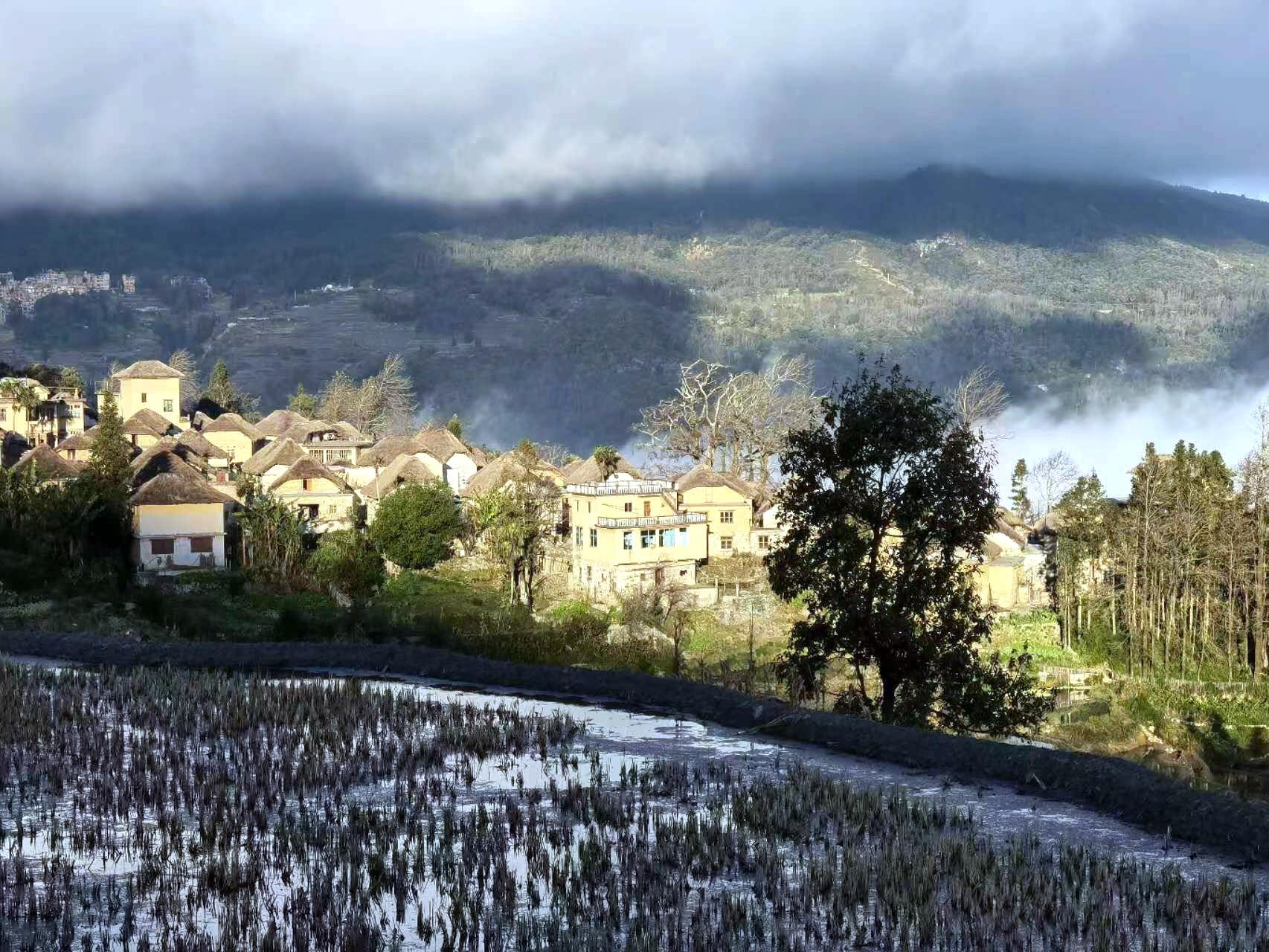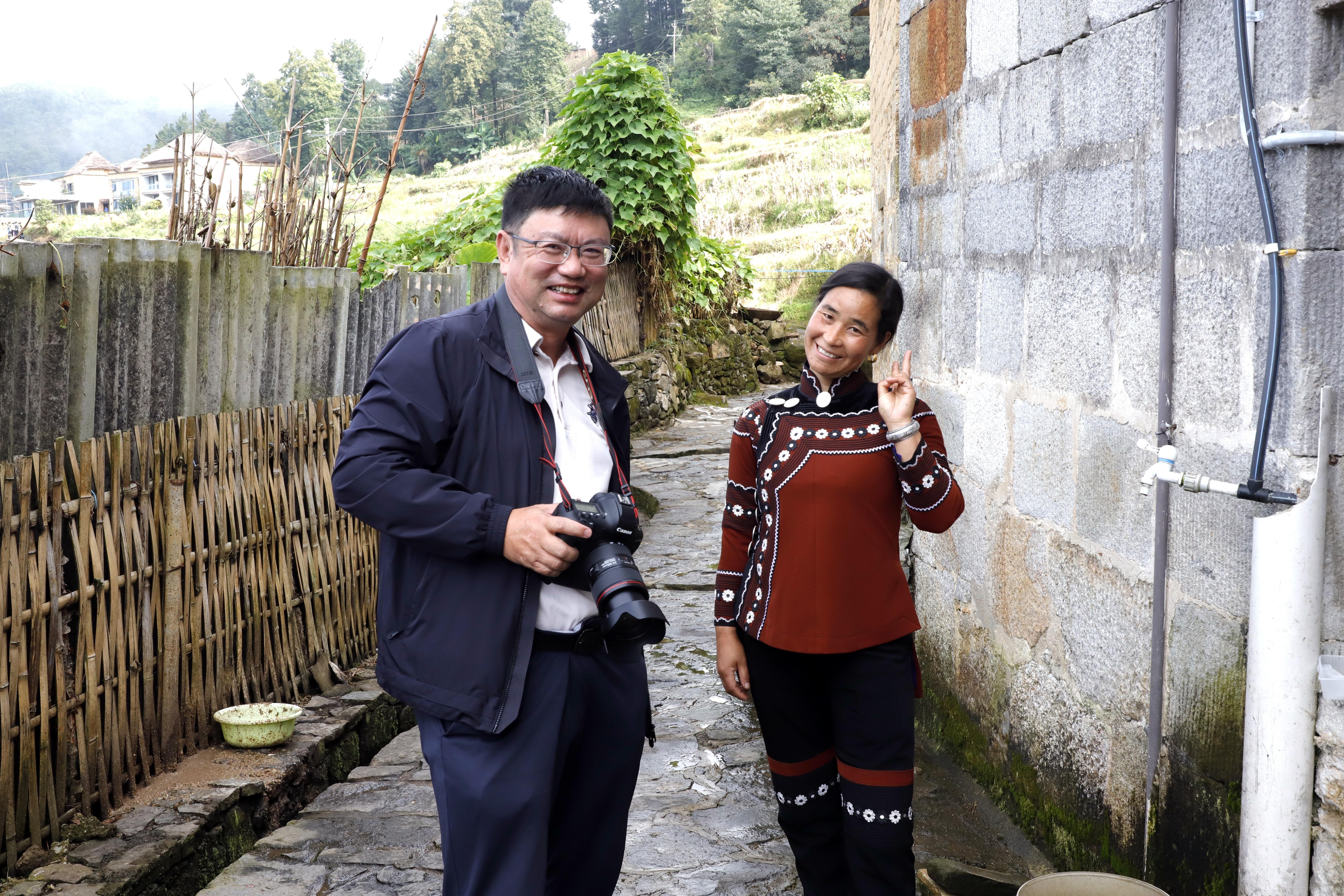University professor recognized by UN as rural areas develop the means to attract visitors and boost residents' income through innovative approach, Yang Feiyue reports.
 The sun breaks through to illuminate Azheke village's picturesque setting in Yuanyang county, Yunnan province. (PHOTO PROVIDED TO CHINA DAILY)
The sun breaks through to illuminate Azheke village's picturesque setting in Yuanyang county, Yunnan province. (PHOTO PROVIDED TO CHINA DAILY)
In early July, Bao Jigang led a dozen of his students to a rural village that has attracted the world's attention over the years.
Azheke village lies deep in the mountains on the outskirts of Yuanyang county, in Southwest China's Yunnan province, nestled among the millennium-old rice terraces created by Hani people. The terraces were inscribed on the UNESCO World Heritage List in 2013 as a resilient land management system that demonstrates extraordinary harmony between people and their environment, both visually and ecologically, based on exceptional and long-standing social and religious structures.
Explaining that the goal of the trip was for the students to engage in field learning and come up with more methods for rural vitalization, Bao, a professor at Sun Yat-sen University in Guangzhou, the southern province of Guangdong, says that "I had them stay in the village to interact with villagers and appreciate the local intangible cultural heritage, to measure the effects of the vitalization efforts, and answered their questions about approaches that initiate positive changes".
Bao, who is in his 50s, first visited the village in January 2018 to investigate the traditional thatched, mushroom-shaped Hani houses at the invitation of the local government. With its panoramic views across the rice terraces and distinctive architecture that emerges from rolling clouds, Bao appreciated the village's potential for tourism development.
Back then, local villagers lived off the land and had meager incomes, and most young people chose to leave home to make a living elsewhere. As a result, the old houses were crumbling, posing a threat to the inheritance of the Hani traditions and culture.
Bao and his team proposed a poverty alleviation plan which motivated villagers to protect their traditional houses via a dividend system.
The plan involved the Yuanyang county government and the village to jointly establish a tourism company, with 70 percent of profits being distributed among villagers, while the rest covers costs and is put in a development fund.
"Over the past five years, we have distributed dividends to the villagers seven times, with a total dividend of approximately 14,000 yuan ($1,939) per household," Bao says, adding that local tourism development has recovered to the pre-pandemic level this year.
"It is expected that the dividend per household will exceed 10,000 yuan," he says.
Under the plan, the once secluded village has become a well-known destination for travelers from far and wide.
 The millennium-old rice terrace created by the Hani people entered the UNESCO World Heritage List in 2013. (PHOTO PROVIDED TO CHINA DAILY)
The millennium-old rice terrace created by the Hani people entered the UNESCO World Heritage List in 2013. (PHOTO PROVIDED TO CHINA DAILY)
Sustaining local culture
Wu Canxi, a student at Sun Yatsen University, has seen remarkable changes in the lives of the villagers since she first came to the village to conduct a field study and survey in 2021.
Now, most locals can speak Mandarin, and some also speak a few words of English and use computers to settle accounts, Wu says.
She has provided advice for the tourism company's operation and training programs for the villagers.
Wu has got good measure of the plan that all the residents voluntarily devote themselves to, as they know that "it enables them to protect their culture while earning a living".
The plan is among Bao's many achievements that have won him the United Nations World Tourism Organization's Ulysses Prize for Excellence in the Creation and Dissemination of Knowledge in Tourism, which is awarded to a distinguished scholar for his or her outstanding contribution to creating and disseminating knowledge of innovative tourism.
"I received an email informing me of the prize from UNWTO in April," Bao says.
Bao is the first scholar from the Chinese mainland to receive the prize. He will attend the award ceremony in Uzbekistan in October and deliver a speech.
His Azheke tourism poverty alleviation project has been called a really beautiful way of translating a national aspiration into local efforts by the UNWTO.
"Receiving this award is a testament to the international recognition of China's overall level of tourism education and research," Bao says.
Bao has committed himself to internationalization of tourism research throughout his career.
Since 2014, Bao has worked with the Hong Kong Polytechnic University's School of Hotel and Tourism Management to stage an annual training session that lasts for seven to 10 days for doctoral students in the field of tourism management.
"Approximately 10 professors will be invited to give classes on topics related to their latest research, such as influential theories and methods," Bao says.
He considers it a great complement to the routine college curriculum, since better understanding of the world, such as things that matter to international guests, will help boost domestic tourism.
"We have invited scholars from all around the world and trained more than 500 students so far," Bao says.
This has had positive results, as the number and quality of student papers have both grown significantly in recent years.
Bao studied geography all the way from his bachelor's degree to his doctorate, which he says laid a solid foundation for his tourism studies, since it exposed him to the relations between nature and people.
 Thatched homes, a signature style of Hani architecture, are scattered like mushrooms in verdant fields under rolling clouds in Azheke. (PHOTO PROVIDED TO CHINA DAILY)
Thatched homes, a signature style of Hani architecture, are scattered like mushrooms in verdant fields under rolling clouds in Azheke. (PHOTO PROVIDED TO CHINA DAILY)
New attraction
From 1995 to 1997, as a visiting scholar, Bao was able to exchange ideas with dozens of distinguished international tourism professors and experts in Canada and the United States. He was inspired by their ideas and delivered innovative methods to deal with practical problems.
Bao once heard about the tourism area life cycle theory proposed by the geographer Richard Butler, who has taught on tourism in Canada. Drawn on the theory, Bao diagnosed the stagnant growth in tourism numbers at Danxia Mountain in the northern Guangdong, in 1992.
"I figured the mountain resort needed to develop new resources to break the bottleneck and attract more visitors," Bao says.
Local authorities followed his instructions and developed a new national attraction that covers an area of 3.5 square kilometers on the mountain. The destination has since then received about 1 million visitors annually, as opposed to 200,000 before.
Bao has also played an important role in transforming Yangshuo county of Guilin, in South China's Guangxi Zhuang autonomous region, into a tourism hot spot worldwide.
When residents were fighting for shares of the riverboat ticket income in the 1990s, he noticed the fundamental problem was that the county failed to retain guests after they had done the cruise along the Lijiang River.
Yangshuo boasts stunning natural sceneries, and Bao then alerted local authorities that it was lack of accommodation and catering services that failed the local tourism development.
He has made a point of conducting investigations, especially in Yunnan and Guizhou provinces, and often gained knowledge that was not found in books during the process.
"Being down-to-earth and conducting in-depth research is crucial," Bao says.
"I began with practical issues, which has influenced my research over the past few decades. It is fair to say that most of my research achievements have been derived from China's reality.
"My value is about using my knowledge for the benefit of the people," Bao says.
He was among the first to propose government intervention in historical villages with tourism development potential, when studying Xidi and Hongcun ancient villages in Anhui province that were listed as a World Heritage Site in 2000.
"Without it, commercialization is likely to go overboard. For example, aboriginal villagers might have to move," Bao says.
He also called attention to giving tourism yields back to locals who have helped to create the attractions, so the community in the tourism zone is better motivated to join and upgrade the destination management.
 Bao Jigang greeted by a villager during a field study in Azheke, Yuanyang county, Yunnan province, in 2021. (PHOTO PROVIDED TO CHINA DAILY)
Bao Jigang greeted by a villager during a field study in Azheke, Yuanyang county, Yunnan province, in 2021. (PHOTO PROVIDED TO CHINA DAILY)
Tourism observatories
Since 2005, Bao's team has worked with the UNWTO and established Sustainable Tourism Observatories across the country, including in Yangshuo, Huangshan in Anhui, Zhangjiajie in Hunan province, the Kanas scenic area in the Xinjiang Uygur autonomous region, Xishuangbanna Dai autonomous prefecture in Yunnan, Changshu in Jiangsu province and Jiangmen in Guangdong province.
"We keep close tabs on the changes in the environment, air and water quality, as well as noise and pollution indicators following tourism development," Bao says.
"We also consider the local residents' attitude toward tourism development, their welfare, whether it brings economic benefits or losses, and the satisfaction levels of tourists. It is a diagnostic assessment of the development of tourism," he adds.
When they observed a decline in local satisfaction that was largely associated with overcrowding and price increases, they talked to local authorities to come up with ways that could involve more people in tourism to generate income.
"So, all things can balance out eventually," Bao says.
Since 2010, Bao has provided training to people in Indonesia, Mongolia, Thailand, Cambodia, New Zealand and Japan that are interested in building UNWTO Sustainable Tourism Observatories, which has boosted international destination exchanges and cooperation.
"The overall position of China's tourism is continuously improving in the world, and the country's tourism scale contributes significantly to the development of global tourism, ranking among the top," Bao says.
"Particularly, outbound tourism has become an important force driving the global economic recovery."
Bao believes the elevated status of Chinese tourism is a crucial support for his winning the UNWTO award.
Bao says he is optimistic about the recovery of China's tourism industry. He says the ultimate goal is to ensure that tourists come and leave with satisfaction.
"The sustainable development of the tourism industry means that local residents, tourists, government and businesses should all fulfill their respective roles and benefit from their involvement," Bao says.
He hopes to spread the experiences of the Azheke plan in other areas of the country.
A workstation has been launched in a village in Turpan, in Xinjiang, to promote sustainable tourism and cultural development in the Azheke way.
"Related work has been going on smoothly for a while, and is expected to pay dividends," Bao says.
The site has also become a teaching spot for his students.
"I hope through field studies, everyone can break free from rote learning and the exam-oriented education, and focus on cultivating independent thinking skills," he says.
Contact the writer at yangfeiyue@chinadaily.com.cn


